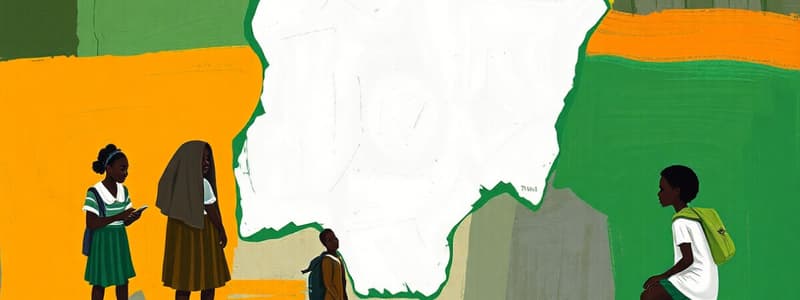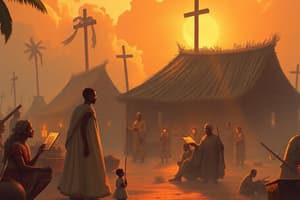Podcast
Questions and Answers
What was the primary focus of the Ashby Commission set up before Nigeria's independence?
What was the primary focus of the Ashby Commission set up before Nigeria's independence?
- Examine higher education needs (correct)
- Standardize university entrance exams
- Increase vocational training
- Review primary education
Which committee was responsible for reviewing higher education related to teacher education?
Which committee was responsible for reviewing higher education related to teacher education?
- The Fafunwa Committee (correct)
- The Ajayi Commission
- The Banjo Commission
- The Ikoku Committee
What major change was recommended by the Ikoku Committee regarding secondary education?
What major change was recommended by the Ikoku Committee regarding secondary education?
- Introducing a six-year secondary education course (correct)
- Integrating vocational subjects into primary education
- Extending the secondary education course to seven years
- Eliminating six-year primary education
What was a significant outcome of the post-independence education reforms in Nigeria?
What was a significant outcome of the post-independence education reforms in Nigeria?
Which commission focused on the increase in school fees during the post-independence education reforms?
Which commission focused on the increase in school fees during the post-independence education reforms?
What was one of the recommendations made by the Old Man Commission regarding primary education?
What was one of the recommendations made by the Old Man Commission regarding primary education?
How did the northern region's approach to education before independence differ from other regions?
How did the northern region's approach to education before independence differ from other regions?
What key recommendation stemmed from the Banjo Commission's review?
What key recommendation stemmed from the Banjo Commission's review?
What was a key objective of the national seminar organized in 1973?
What was a key objective of the national seminar organized in 1973?
Which of the following was a declared objective in the 1973 educational policy seminar?
Which of the following was a declared objective in the 1973 educational policy seminar?
Which segment of the Nigerian education system is meant for ages 0-4?
Which segment of the Nigerian education system is meant for ages 0-4?
What is the compulsory stage of education in the Nigerian education system?
What is the compulsory stage of education in the Nigerian education system?
Who headed the implementation committee formed after the declaration of the national policy on education in 1977?
Who headed the implementation committee formed after the declaration of the national policy on education in 1977?
How long is the kindergarten education provided in the Nigerian education system?
How long is the kindergarten education provided in the Nigerian education system?
When did the federal government launch the universal free primary education (UPE)?
When did the federal government launch the universal free primary education (UPE)?
Which of the following objectives was NOT declared in the second development plan (1970-1974)?
Which of the following objectives was NOT declared in the second development plan (1970-1974)?
How many new primary schools were established in Nigeria between 1945 and 1958?
How many new primary schools were established in Nigeria between 1945 and 1958?
What was one of the significant contributions during the development of Nigerian education policies?
What was one of the significant contributions during the development of Nigerian education policies?
Which commission report was published in 1960 and influenced Nigerian educational policy?
Which commission report was published in 1960 and influenced Nigerian educational policy?
What was a main focus of the educational policies after Nigeria gained independence?
What was a main focus of the educational policies after Nigeria gained independence?
In what year was the National Curriculum Conference held in Lagos?
In what year was the National Curriculum Conference held in Lagos?
Which area was NOT one of the nine major aspects proposed for the national policy on education?
Which area was NOT one of the nine major aspects proposed for the national policy on education?
What was a key outcome of the national curriculum conference held in 1969?
What was a key outcome of the national curriculum conference held in 1969?
What role did women's education play in the national policy on education?
What role did women's education play in the national policy on education?
What age range defines primary education in Nigeria?
What age range defines primary education in Nigeria?
What is awarded at the end of junior secondary education in Nigeria?
What is awarded at the end of junior secondary education in Nigeria?
What type of education follows the completion of basic education in Nigeria?
What type of education follows the completion of basic education in Nigeria?
Which examination certifies students at the end of Post-Basic education in technical colleges?
Which examination certifies students at the end of Post-Basic education in technical colleges?
Who primarily controls primary education in Nigeria?
Who primarily controls primary education in Nigeria?
What is the main role of the federal government in Nigerian education?
What is the main role of the federal government in Nigerian education?
Which agency is NOT mentioned as a regulator of tertiary education in Nigeria?
Which agency is NOT mentioned as a regulator of tertiary education in Nigeria?
What follows primary education in the Nigerian educational structure?
What follows primary education in the Nigerian educational structure?
What is the purpose of the Unified Tertiary and Matriculation Examination (UTME)?
What is the purpose of the Unified Tertiary and Matriculation Examination (UTME)?
Which body is responsible for approving and accrediting all university programs in Nigeria?
Which body is responsible for approving and accrediting all university programs in Nigeria?
How many institutions can a candidate choose when registering for the UTME?
How many institutions can a candidate choose when registering for the UTME?
What is the typical duration of an undergraduate program in engineering at Nigerian universities?
What is the typical duration of an undergraduate program in engineering at Nigerian universities?
Which institution evaluates and accredits polytechnics and technical colleges in Nigeria?
Which institution evaluates and accredits polytechnics and technical colleges in Nigeria?
Which of the following programs typically requires the longest duration for completion?
Which of the following programs typically requires the longest duration for completion?
What kind of reforms is ongoing in the Nigerian educational system according to recent initiatives?
What kind of reforms is ongoing in the Nigerian educational system according to recent initiatives?
How many accredited federal, state, and private universities were there in Nigeria by 2011?
How many accredited federal, state, and private universities were there in Nigeria by 2011?
Flashcards are hidden until you start studying
Study Notes
Post-Independence Education in Nigeria
- Regional control of education persisted after Nigeria gained independence in 1960, with expansion, especially at primary and secondary levels.
- The Ashby Commission was established before independence to evaluate higher education needs, reporting in 1960 with a plan for teacher education university programs.
- The Old Man Commission (1961) in the northern region recommended administrative changes for universal primary education, emphasizing collaboration with voluntary agencies.
- The Ikoku Committee (1962) assessed education progress, leading to recommendations on primary, secondary, and teacher education.
- Recommendations from the Ikoku Committee included:
- Reducing primary school education from seven to six years.
- Introducing a six-year secondary education course and phasing out the sixth form.
Educational Commissions and Expansion
- The Banjo Commission (1961) in the western region reviewed primary and secondary school systems, also contributing to educational reforms.
- The Ajayi Commission (1963) focused on rising school fees, advocating for fee reductions and improvements to the education system.
- Post-independence saw remarkable educational expansion, with a focus on making the educational system relevant to Nigeria's economic, social, and cultural needs.
- The northern region prioritized a qualitative education system, constructing 1,300 new primary schools and 36 secondary schools by 1958, while establishing crafts schools.
Development of National Policy on Education
- Nigerian education policy evolved from colonial times through independence, influencing all education levels.
- Key reports, including the Phelps Stokes (1922), El Jot (1943), and Ashby (1960), laid the groundwork for post-independence educational policies.
- At the JCC meeting in 1964 and the National Curriculum Conference in 1969, major areas for educational policy were addressed.
- Nine crucial aspects of the national policy were identified, including national philosophy, objectives of various educational levels, and women's education.
Implementation and Revisions
- A national seminar in 1973 adopted recommendations from the 1969 conference, focusing on creating a free and democratic society, among other goals.
- The 6-3-3-4 education system was established, outlining six years of primary, three years of junior secondary, three years of senior secondary, and four years of tertiary education.
- The Federal Government launched the Universal Free Primary Education (UPE) in 1976.
- The national policy on education was officially declared in 1977, with further revisions occurring since then.
Prescribed Standards for Nigerian Education
- Four standards in the Nigerian education system:
- Early Child Care and Development (ECCD) for ages 0-4, primarily in the private sector.
- Basic Education consisting of one year of kindergarten, six years of primary, and three years of junior secondary education, declared compulsory and free.
- Post-Basic Education provided in senior secondary schools and technical colleges, leading to various certifications.
- Tertiary Education delivered in universities, colleges of education, and polytechnics, with institutions determining course content aligned with regulatory agency standards.
State of Education in Nigeria
- Education in Nigeria is a collaborative responsibility among federal, state, and local governments, with federal oversight mainly in tertiary education.
- Students complete nine years of Universal Basic Education (UBE) before moving to senior secondary or technical schools.
- Various examination bodies oversee certification for post-basic education, including WAEC and NECO.
- Unified Tertiary Matriculation Examination (UTME) is mandatory for admission into Nigerian universities.
- As of 2011, Nigeria had 117 accredited universities, 59 polytechnics, and over 97 colleges of education, reflecting a diverse educational landscape.
- Undergraduate program durations vary, with four to six years depending on the field of study, and advanced degrees require additional years of study.
- Continuous government reforms aim to enhance the educational system, including the upgrade of colleges and accreditation of private universities.
Studying That Suits You
Use AI to generate personalized quizzes and flashcards to suit your learning preferences.




